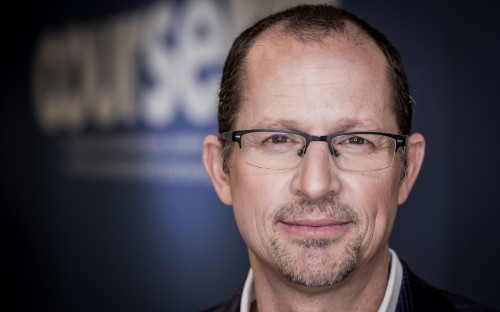The online learning platform now boasts around 2,700 MOOCs—Massive Open Online Courses—from 150 universities, and it keeps expanding.
Coursera has built up an audience of millions of degree-hungry philomaths—once they take a bite, it seems, they are open to more and more commitment. More than 50% of the students on Coursera’s degree programs began life as consumers of singular modules on the platform.
Coursera has also just added six more fully-online degrees to the platform, making a total of 10.
Among those degrees are a Master’s in Innovation and Entrepreneurship from HEC Paris; a Master of Public Health from the University of Michigan; a Global Master of Public Health from Imperial College London; and the flagship online MBA offering—the iMBA from the University of Illinois.
The first graduating class from the University of Illinois’ iMBA did so in November 2017. In two years, Coursera CEO Jeff Maggioncalda explains, the program went from nothing to over 1,000 students.
“It was so successful that they shut down their EMBA and rolled it into the online MBA program. It’s time to move degrees online,” he asserts.
Does the growth of fully-online degrees highlight a shift in the way we receive...
READ: Opinion: How The MOOC Became A Cash Cow For Business Schools
No retention tension
One concern around online programs is engagement. But the completion rate for online degree programs on Coursera is 90%. An impressive stat, and one kept under control by “really cool” machine learning algorithms, Jeff adds.
It’s called the ‘Learner at Risk Model’, and it helps Coursera spot learners who may be struggling to keep up with workloads or are falling behind for other reasons.
“We see when people are logged on, when they’ve watched a video, missed a question, or engaged with chat,” Jeff explains. “You can predict when someone’s not doing well—when they’ve done poorly on a test and not logged in for three days!”
The ability to provide academic advising on the back of the ‘Learner at Risk Model’ is “phenomenal”, Jeff adds. “It’s more intimate than on-campus! I expect the retention to remain really high, at least with the elite degrees.”
Such high retention rates could stem from the fact that mobile learning has delivered knowledge acquisition into the 21st century with aplomb.
80% of Coursera degree learners do so on their mobile phones, Jeff says. “I knew mobile was important when I was travelling,” he adds, “but 50% of learners are from emerging markets, and they use mobile phones because they don’t have computers—you just go to a Wi-Fi hotspot and download [the content].”
Those who undertake online degrees through Coursera tell Jeff there are multiple reasons for the importance of mobile learning: “They say they only have two years [to complete the course], they have a full-time job, and they are learning as much as a full-time student.”
They need to be able to learn when commuting, during lunch, before dinner, after their kids have gone to bed. Every ounce of time they have has to be dedicated to the completion of the degree, and mobile is the only way to pack time to the rafters.
That method of education delivery would have been a blessing to Jeff during his MBA days. He studied at the Stanford Graduate School of Business—graduating in 1996—and admits it was a logistical labyrinth.
“I had two children when I studied the MBA,” he explains. “I had to have study groups over to my house because my wife was working and so I was babysitting—it was something new for my classmates!
“I loved Stanford, but I ended up $80,000 in debt after I gave up a job of $100,000 per year, and I then had to pay tuition and look after two kids—it would have been way more convenient not to have had to quit my job.”
Although he made a lot of friends, he says, and remained in touch with them over the years, there is one striking feature of the iMBA which for him sets the online study method apart from Stanford circa 1996.
“Because of digital technology, and the way they [the students] are all working, they formed not only study groups but mentor groups. “They told me: ‘I was applying things I was learning, and when I had a problem on the job I’d reach out to my classmates’.”
iMBA students come from a variety of industries and countries and have a wealth of work experience between them. That translates into digital communication skills and on-hand mentors to assist students when they face problem solving in their daily lives. “I never did this at business school!” exclaims Jeff.
The iMBA counters many of the caveats thrown at online degrees, especially MBAs—that you lose out on the vital networking, and don’t develop the face-to-face communication skills akin to the bona fide business world.
But, you do develop those skills, just digitally, and in a format that will become the format most familiar to us in the coming years. Anyone learning online, and communicating across digital borders, is going to develop a skill that will become especially vital for the future of work: digital empathy.
“If you want to be a leader in the 21st century,” says Jeff, “the chances are that learning in the same mode as you are leading is a good idea.”
Institutionally challenged
No great implementation of modernization ever came to fruition without niggly challenges pricking you along the road. For Coursera, and the universities who deliver the content, that challenge comes from people in academia caught in old ways of thinking.
Academic fellows lament universities and industries not working together. Jeff has to remind them that right now, on Coursera, there are 1,000 companies using university content to train their workers through Coursera for Business.
There are also those concerned that university degrees will be supplanted by myriad micro-credentials. Again, Jeff says, this isn’t the case, as the universities allow course takers on Coursera to build up their micro-credentials into a fully-fledged degree.
By breaking down each degree into its component parts and offering them as Mastertrack certificates, Jeff says people can slowly build up a portfolio of skills. No longer does one need to attend a full three-year course to obtain a degree—with Coursera, degrees can be acquired over longer periods of time.
“We think the idea of modularizing degrees and letting people buy them in pieces is a very big trend,” Jeff confirms.
Another issue, he adds, is the governance and decision-making in higher education. Though not insurmountable, to bravely tackle the system of higher ed means battling with a system designed for “stability and inertia.”
“It’s not designed for agility, so one of the reasons we’re doing the Mastertracks is so universities with a few professors who are ready to go now, don’t have to wait for all the other professors to finally get on board,” says Jeff.
Has he been surprised by the success of Coursera?
“When I came in, we were doing a bunch of things, and the vast majority turned out to be pretty smart. I reorganized a bit, but the business model is great, and growing. I am surprised at how well the company is performing and how much demand there is!”
The demand shows the future of work and learning are converging. Work, Jeff thinks, is going to be largely about capitalizing on change at the same time as avoiding the threats it brings. Work is going to become way faster, and because of technology the skills we need to complete the daily grind are going to be morphing just as quickly.
“I do think lifelong learning is a by-product of a changing world,” Jeff concludes, “and this is how businesses are going to win or lose.”
So, the message is clear; it’s time we all moved our schooling online.
Register for free to continue reading
RECAPTHA :
48
b6
62
8b













The best of our Premium Articles